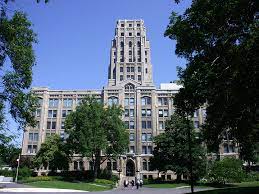When I was scholar-in-residence in the Ontario Cabinet Office (2003-04) I took a tour of the hidden in plain sight Whitney Block Tower. The Whitney Block – original home of the entire Ontario Public Service – stands opposite Queen’s Park at the corner of Wellesley and Queen’s Park Circle. This classic modern Gothic- art deco building now houses the Premier’s Office and Cabinet Office. The seven-storey tower no longer meets building code standards and has been unoccupied for 50 years.


During my year in Cabinet Office I had the idea of renovating the tower, bringing it up to code, and using it as a museum of the history and work of the Ontario Government. The McGuinty Government was elected in October 2003, believing that government could be a force for good, and I thought my idea would be consistent with their outlook. But building such a museum would be expensive, since it would involve installing new elevators, and would create logistical conflicts with the Premier’s and Cabinet Offices, which were on the top two occupied floors. The Whitney Block is currently being renovated, but the tower remains empty.
The Virtual Museum Project
Years later, I’m delighted to see that Marc Holzer, an academic colleague (founding dean of the School of Public Affairs and Administration at Rutgers University) and friend, has developed a more ambitious but implementable version of this idea, and is trying to realize it. Holzer’s idea is to build a virtual, rather than bricks-and-mortar museum of public service. The prospectus describes its mission as “offer[ing] engaging, in-depth, multimedia exhibits that highlight the positive roles public servants, institutions, and their partners, have played in delivering government’s promises to the public. These public servants and institutions have immeasurably improved the quality of life for all stakeholders across the realms of health, education, the arts, criminal justice, defense, security and dozens of other services that build social capital.”
The virtual museum (in essence a website) will have galleries (pages) on a host of topics including public service as a profession, elected office, civic architecture, technology, environmental protection, the military, high-performing public organizations, libraries, diversity, non-profit organizations, public education, and civic engagement. The technology will enable the museum to link to data visualization and infographics, podcasts, and YouTube videos. Here is a link to the complete prospectus. The floorplan is below.

The Challenge
The Museum is being launched in the US, an extremely challenging context for its mission. The Republican Party has repeatedly denigrated and defunded public services. Public trust in government institutions, as measured by the Pew Research Center’s ongoing surveys, has been declining for half a century and is now standing at historic lows. The entertainment industry has reinforced public opinion with streaming series such as House of Cards, that portray politicians and public servants as venal, and Veep, that portray them as incompetent. The Museum aims to lean into this hurricane of criticism, invective, and mistruth by setting out a counter-narrative of public service idealism. That is why it is essential to build the Museum.
The Ask
The Virtual Museum of Public Service has just launched a GoFundMe campaign, attempting to raise $100,000 by next September to build, launch, and maintain the website. The Virtual Museum of Public Service is a registered non-profit in the US and donations are 100 percent deductible against US income. I strongly believe this is a cause worth supporting, especially now, which is why I am writing this post and contributing financially. I hope that readers, particularly those who live in the US and/or have US-based income, will contribute generously.

Leave a Reply